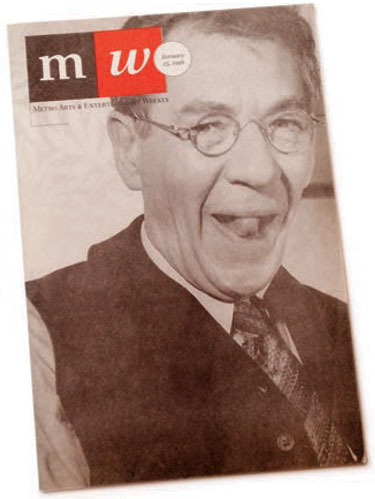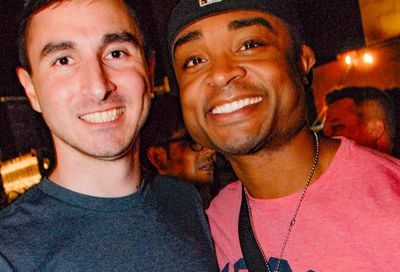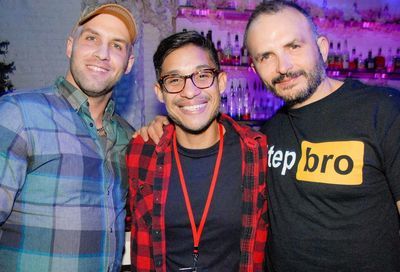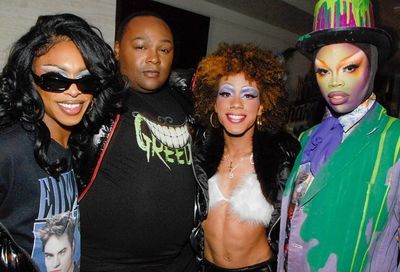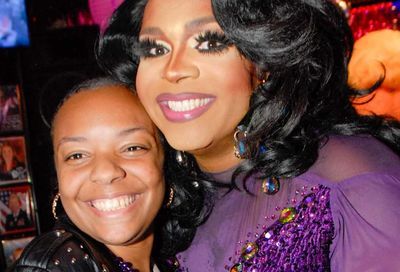20 Great Interviews from the Pages of Metro Weekly
20 Years of Metro Weekly
Everyone has a story. Since the beginning, Metro Weekly has shared those stories. More often than not, they’re in the sources’ own words. We’ve just been there to ask the questions, to prod for a little more here or there. The results have been astonishing, particularly with the many who have given us the time to talk at length and feature them as a cover story. These long-format “Q and A” interviews have come to characterize the magazine as strongly as any single element could.
Aside from being purely entertaining, the breadth of these interviews takes us on a trip from a time when AIDS had a stranglehold on the community, to when “gay” was just evolving into “LGBT,” to a change in tone toward earnest optimism, like George Takei’s accurate take on the future.
With more than 700 interviews to choose from, as rich as they are, it’s impossible to choose the 20 “greatest.” But a taste from 20 great interviews? That’s easy.
1. Quentin Crisp, “Queen of Queens”
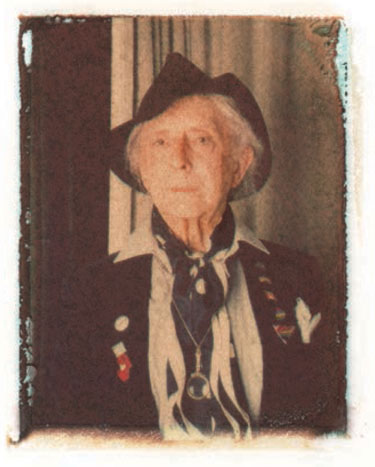
Quentin Crisp
December 22, 1994
Interview by Randy Shulman. Photography by Annie Adjchavanich. Illustration by Paul Myatt
METRO WEEKLY: What are your thoughts about AIDS, which has affected the gay community so profoundly.
MR. CRISP: It has — and I don’t know why. When I was young, syphilis was all the rage. And none of us took any notice of it. We went on as we’d always gone on, and we didn’t catch it. Now people who have caught AIDS are regarded as martyrs. There’s no candelight vigil for people who have died of heart attacks.
MW: Are you saying we’re making too much fuss about AIDS?
MR. CRISP: We are making AIDS a sacred cause.
MW: Have you ever had a great love?
MR. CRISP: No, I don’t really understand what love is. I knew one man for four years. He came and visited me in my room every weekend for four years. And my life became a series of weekends for which I prepared.
MW: Didn’t you love him?
MR. CRISP: I was sorry for him. Because in knowing him, I knew the whole world. He was the first person who gave me a glimpse of what it is like to be a human being.
MW: What would you say to those who would abolish homosexuality?
MR. CRISP: You can’t abolish homosexuality. And if you make it unacceptable, it will go underground. And then it will be murky and dismal and frightening. I don’t think legislation makes any difference. When the law was changed in England and consenting adults were allowed to carry on, a woman said to me, “It has made a lot of difference to you.” And I said, “It made no difference to me. Nobody ever pointed at me and said, ‘Look at him, he’s illegal.’ They pointed at me and said, “Look at him, he’s effeminate.'” That remains forever. You are marked down. You are worthless. You are alone.
2. Michelangelo Signorile, “The Next Level”
June 22, 1995
Interview by Sean Bugg. Photography by Randy Shulman
MW: You’ve gotten involved with the controversy about possible closing of bathhouses and sex clubs in New York. Have you found that’s one of the reasons people are upset with the stances you’ve taken?
SIGNORILE: The bathhouse thing has been completely distorted and blown out of proportion. … We are in the middle of a health emergency. If what I’m proposing is an inconvenience, I’m sorry. I’m sorry for a lot of things — but that’s how it is. It’s an inconvenience, it’s not the end of the world. It’s not a quarantine. Nobody said you can’t have sex in your house and do whatever you want. We’re trying to stem transmission that occurs in an establishment where there’s multi-partner unsafe sex. Yes, unsafe sex may be happening in the home, too. But where is most transmission happening? Where is it happening exponentially? We don’t know that. And some evidence has shown that the closing of the bathhouses had an effect on bringing transmissions down. Nobody wants to close them; we just want to make them safe.
MW: Beyond making them a “place that’s safe,” do you see sex clubs as a viable educational tool?
SIGNORILE: Absolutely. When they’re safe. They can create a community norm that extended outside of the clubs in how people behave at home. There was a norm set up, and that norm was you don’t have anal sex without a condom. If somebody did it you were, like, “Hey, are you crazy or something?” That broke down completely.
MW: You spend a lot of time in the book discussing the uses of computer technology such as on-line services in the coming out process.
SIGNORILE: I think [computer technology] is going to be seen as a revolution in the gay community. In terms of political organizing, it’s a great tool. I get e-mail from everyone in the gay community who’s organizing anything and wants action right away, a blitz of someone’s office right away with e-mail. In terms of the closet, it’s making it so much easier for people to access information about homosexuality. It’s providing a place where people can make their first steps. I’ve interviewed so many people who think they wouldn’t have been out at all if not for the Internet, especially people living in small towns and out in rural America. I think it’s going to bring millions of people out of the closet over the next twenty years.
3. Ian McKellen, “Ian for All Seasons”
Interview by Randy Shulman. Photography by Todd Franson
MW: You came out in 1988. Talk a little about your life as an openly gay actor and what led to your finally coming out.
MCKELLEN: What led me to it was having lived for 49 years as a gay man and realizing that I always had been out — except to the media and to my family. Everybody else in my life knew. And I didn’t realize until I came out what a weight that being in the closet had been. I wish I’d come out twenty years earlier.
MW: Do you ever look back with regret?
MCKELLEN: I don’t look back with regret, I just regret it. You wonder how different your life would have been. But I don’t regret the results of my life, particularly with regard to my career, because what I’m doing now gives me enormous pleasure. And perhaps if I’d been openly gay, I wouldn’t have needed to act as much as I did — I wouldn’t have needed to so obviously draw attention to things that I was happy about in myself in order to deflect attention away from things that I wanted to keep a secret. That’s a dreadful way of carrying on, but I think it’s one of the motives that made me an actor.
MW: Has there been a great love in your life?
MCKELLEN: Yes, there has. But I’m not going to talk about him, because he’s not here to talk about me. If we were here together that would be a different matter. But I hope it’s not the only love. At the moment I live by myself, and I’m increasingly aware of what I’m missing through not living with somebody else. Whether that situation will ever change, I don’t know.
4. Jessica Xavier, “2 Lives to Live”
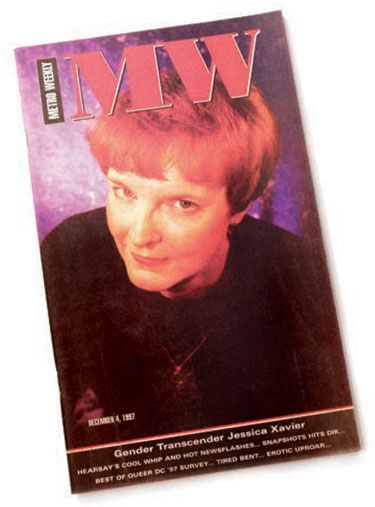
Jessica Xavier
December 4, 1997
Interview by Randy Shulman. Photography by Todd Franson
MW: Is your vagina fully functional?
XAVIER: Yes. I can’t have kids, of course. But I do have sexual response and I’m pleased with what I got. It could have been better, but the surgeon I went to at the time…was doing this one very basic straightforward technique, and since he had the lowest rate of post-op complications, he was the guy that I went to.
MW: How could it have been better, if you don’t mind my asking?
XAVIER: I don’t have a clitoris, and I think I would have liked to have had one. I haven’t gone back for a labia plasty.
MW: Can you have a sexual encounter with a man?
XAVIER: I’m a little shallow in that regard. It would probably be painful. So I haven’t yet.
MW: Do you still experience orgasms?
XAVIER: Yes. Most transsexual women have vaginal orgasms. … It’s hard to dislike any orgasm, but I kind of like my orgasms now better.
MW: Is there anything you miss about being a man in society?
XAVIER: I miss some of the physical strength that I used to have as a man: it’s much harder for me to lift heavy objects now. Oh, and one other thing: I miss being able to pee standing up.
5. Dixie Carter, “The Importance of Dixie”
Interview by Randy Shulman. Photography by Todd Franson
MW: Do you have any thoughts on gay rights?
DIXIE: I think that gay rights should exist.
MW: Let me be more specific. What about the possibility of gay marriage?
DIXIE: That’s hard for me, because I’m very old fashioned, very old-timey. So that idea is hard for me. On the other hand, maybe the most loving marriage that I’ve ever seen is a gay marriage. It has not been codified as such by the church, but it is a marriage. And has ben for years and years and years. But to answer your question, I have to work through what marriage means — and the first thing my mind goes to is that marriage is for the procreation of the race. It’s a sacrament to unite people so that they can begin a family and have children. But Hal Holbrook and I got married at an age past when we can expect to have children. So here I am in a very happy marriage that I think is fine. So if I feel that way about my marriage to Hal, why would I have a problem with a gay marriage? Still, it’s hard for me. I’m very traditional.
MW: Another issue that’s been raised recently in a big way is known as “reparative therapy,” where gay people are saying they’ve been cured through various ministries led by the right wing.
DIXIE: I think the word cure is insulting, isn’t it? … Tell me, are these people who are “cured,” are they ever going to be happy?
MW: It’s hard to say.
DIXIE: Well, down the line it will be discovered whether or not they will be happy. I hate to use this corny expression but everybody has got to find out who they are and what their needs are. And putting yourself in a straight jacket for appearance’s sake is not going to get it. But as I’ve said, I’m old-fashioned. I’m still trying to work through [the idea of] women preachers. I am a person for whom change is difficult. I don’t agree with the way that children are brought up now for the most part. I can’t bear to see them in those little tennis shoes they put on children. Please. And those vile colors. I just want to see little babies in white. I want to see them in pastels. I don’t want to see them in red and black… I feel like such an anachronistic person, but I am slowly coming around — my children are slowly getting me close to where I should be. Maybe by the turn of the century, I’ll be up with everybody else.
6. Lawrence R. Banks, “The Visible Man”
March 4, 1999
Interview by Randy Shulman. Photography by Todd Franson
MW: You often hear criticism that today’s black movement doesn’t have leaders like Martin Luther King and Malcolm X.
BANKS: It’s an invalid criticism. A lot of what people refer to as “black leadership” is not really black leadership. It’s a white choice of leadership for blacks. I could pick up a newspaper today and be exposed to “black leaders” I know nothing about — people whom, if the “white folks” didn’t put it in the paper or the TV screen, I wouldn’t know anything about. Whites don’t rally around the same people — millions of whites don’t see Bill Clinton as their president.
MW: That’s because whites as a whole never had a perceived “movement.” Not like blacks. Not like gays.
BANKS: The whites had a movement — that’s why there was a civil war. Look, you could walk out of here and down the street, and despite the fact that this is basically a black neighborhood, who is going to pay you much mind? They’re certainly not going to make any decisions about who you are as a person or your value as an individual. But if I were to go in certain areas of this city and just walk, I’d get an awful lot of attention. Blacks are marked, period — before you ever open your mouth. And usually that mark is a negative mark.
Now, I’m not down on whites. I’m not racist. But I suspect there are very few white folks who see a black person and say, “Oh, this is my lucky day, there goes a black person!” … The black person really has to keep his or her own thing together, keep his own counsel.
MW: I understand what you’re saying, but having lived so many years, you must admit, things are better now than when you were a young man.
BANKS: It is better in general terms. But if you are that person for whom it is not better, but worse, the fact that it’s better in general doesn’t help you. Like the guy tied to the back of a pickup truck and dragged for three miles to his death down in Texas. …
MW: Do you at all feel proud of where our society has come in the 71 years you have been alive?
BANKS: As a black gay person, I don’t relate to what the gay establishment is doing, has done or has accomplished. I don’t feel that closely aligned to it. I don’t think it includes me. What blacks have accomplished and are doing affects me because it cuts to the heart and soul of who I am. If I were not gay, I’d still be black. But I don’t feel a part of the gay establishment. Because I think of it as largely exclusive, not inclusive.
7. Kathleen DeBold, “Examining the Mautner Project”
September 21, 2000
Interview by Sean Bugg. Photography by Todd Franson
MW: I’ve been a professional homo for quite a while. Do you feel like we construct our own little world and get caught by surprise when those things come up?
DEBOLD: It makes you feel very safe. It’s funny, even in our little neighborhood, I was walking down the road just getting some exercise. A car came by me and this group of guys yelled out, “Fat dyke bitch!” It was such a shock. But then I was like, “Well, they got all three right.” At 40 miles an hour, they’re good. So you never know.
One thing that’s very hard and complicates lesbian health is HMOs. I had this one doctor who was insisting on giving me a pregnancy test. I said, “I’m not pregnant. There’s no chance I’m pregnant.” And she said, “Well, we are going to do this anyway.” I said, “Look, I have never had sex with a man. This is not necessary.” And she goes, “You’re 42 years old and you’ve never had sex with a man? I don’t believe that.” She said it in this huge loud voice that went out into the waiting room. I was sure that everyone knew. And then, after this whole thing, I thought it was resolved. When the bill came, there was a pregnancy test on it.
MW: And that was a woman doctor?
DEBOLD: Yes, that was a woman doctor.
MW: This could be my own blindness, but I don’t see as many prominent lesbian physicians as I see prominent gay physicians. There’s sort of a gay doctors club and I don’t see the lesbian equivalent of that.
DEBOLD: There are not enough lesbian doctors. Not enough “out” lesbian doctors. Because, you know, it’s a risk for the doctor, too. It’s funny, but sometimes a gay doctor can have so much internalized homophobia, they actually are not helping the client with what they are going through.
It’s hard to be a woman in med school. It’s hard to be a woman and even get into med school. And that’s one thing we are trying to do — get people in med school and train them in the barriers to lesbians getting health care. … It’s a lot easier to get to people young enough before they are set in their ways.
MW: It’s likely that younger doctors might be more comfortable discussing sexual history on their new patients. I know that’s been a big sticking point — just getting doctors to ask.
DEBOLD: Exactly. Sexual questions. And also the way doctors ask questions. They still say, “Are you sexually active?” “No, I just lie there.” Sexual activity is a big ranger. And to a lot of doctors it’s “Yes or no.” Then, “Do you use birth control?” And then they move on. I’ve never had a doctor ask me about anal sex or oral sex or multiple partners. Things they need to know, big time.
8. Larry Stansbury, “Time Well Spent”
January 25, 2001
Interview by Sean Bugg. Photography by Todd Franson
MW: When BHT started and through the earlier years, it was primarily a leather organization, though. The leather community was under a lot of fire during the early part of the AIDS epidemic, from some people who perceived the leather community as an “instigator” of the disease. Did BHT suffer from those types of perception problems?
STANSBURY: All along, there ahs been a misconception what the leather community has been about. We’re very much like everybody else, we just have a particular like of leather. Some of us because we ride motorcycles, and for some people it’s more of a dress statement. But a lot of people just don’t understand that.
The Spartan Motorcycle Club is thirty-three years old. The Academy Awards [of Washington] is thirty-eight years old. Those are two of the longest surviving organizations in this city — a leather group and a drag group. Even though some people see the leather community as one of those “branch” communities, the strength of the gay community has started and continues with the leather community. You’ll find some of the most dedicated people you’ll ever meet.
MW: Would you say the perception of the leather community has changed at all over the past ten years or so?
Stansbury: I think visibility is helping a lot. We don’t make apologies because we wear leather or Levis. A lot of people wear Levis now and guess where it started? And a lot of that started with the D.C. Eagle. So many people have misconceptions about the Eagle. “Oh, that’s a leather bar, I’m afraid to go in there.” It has its own mystique, a well-deserved one. It caters to the leather/Levi community, but everybody’s been welcome there.
MW: One of the reasons I asked about the change in perception is because Mid-Atlantic Leather weekend seems to have grown a lot over the past few years. It seems to draw even more of a “non-leather” crowd, which is interesting because different scenes tend to keep to themselves.
STANSBURY: I think it offers opportunities for people to explore other venues. It would be wrong to assume that every person in leather is into heavy S&M. Some are, but not everybody is.
9. Caushun, “Words of Caushun”
Interview by Will Doig
MW: A lot of openly gay celebrities insist that their sexuality is just a small part of who they are and that their professional lives are separate, but you totally blend your sexuality and your career. In fact, a lot of your lyrics really flaunt the fact that you’re gay.
CAUSHUN: You know, people choose to think, “Oh, he’s gay and he’s exploiting his sexuality.” But sexuality is such a big part of every rapper’s lifestyle. Ninety-nine percent of the rappers out there have songs that talk about their sexual experiences. So if that’s the way the game is played, if other rappers can exploit their heterosexuality, why can’t I exploit my sexuality?
MW: So you think your sexual references are only more apparent because they’re about men rather than women?
CAUSHUN: Exactly. Jay-Z is singing about girls, girls, girls. Well, I’m in that same situation with guys, so that’s what I’m going to rap about. … If I pretend to be a thug when that’s not what I am, I would be succumbing to the pressures of the world, forcing myself back into the closet. That’s not the road I wanted to take. You’ve got to be who you are.
MW: Do you think there are a lot of rappers and hip-hop artists who are gay but still in the closet?
CAUSHUN: Of course. I know rappers who haven’t come out.
MW: Gay has become much more accepted — even hip — in television and Hollywood, yet it remains fairly taboo in the music industry. Why is that?
CAUSHUN: Because so few people in the industry have stood up and said, “What’s so wrong with being gay?” And the only people who do are RuPaul and Elton John and other over-the-top types, the ones who feed into the stereotypes of a typical gay man, a camp man, or a typical drag queen. The fact that they’re so out there makes it easier to digest for the heterosexual community.
10. Rufus Wainwright, “The Reluctant Hedonist”
Interview by Randy Shulman
MW: Do you consider yourself to have an addictive personality?
WAINWRIGHT: I consider myself to be a hedonist.
MW: That said, do you think it’s easier for gay men to fall into and court an addictive lifestyle?
WAINWRIGHT: This is what I think. The kind of historical hedonistic bacchanalian orgy-esque legend of the gay lifestyle is ancient and will always exist. It’s sacred and is a good thing — for a time. Some people think they can do it forever. But I think, unfortunately, a lot of these kinds of attitudes and things existed before chemistry really took off. And also AIDS, a problem which hasn’t been solved yet. And I just find that it’s a real conundrum at this point because we all love to have our wild times but we don’t live in the same sort of world anymore. And you can ask anyone who was coming of age in the sixties and the seventies and the eighties how many lives have been lost already and how many casualties there are. And I just feel that sometimes in the gay world there’s just a total denial of that.
MW: Yet you entered into it as well.
WAINWRIGHT: I totally entered it.
MW: Was there a particular low point that you recall during this period?
WAINWRIGHT: There were many, many low points. Many high moments, many low moments. I think the song on Want One that deals with this whole subject is “Go or Go Ahead.” That was a real low point. I just remember being in my car and pulling over and crying. It was very much about sitting down and facing the exterminating angel.
MW: You claim to have been addicted to sex during this period. Is there a point where you started to view sex in a different way?
WAINWRIGHT: I think sex is a serious powerful force that cannot be put under any heading of good or bad or this or that. It’s to be reckoned with. I’ve done a lot of sexual exploring — a lot. I’m like a sexual Captain Nemo. But it really hasn’t given me anything emotional in the end. In the end, I’ve felt quite bankrupt. I’m happy about what happened, but I’m really looking for love.
MW: But you have to cross a line, I think, to get to a point where you’re ready to look for love.
WAINWRIGHT: I think you do. I also think some people don’t. It’s really up to the individual. There is this idea that if you’re gay you have to go through this really ferocious sexual period, you know? And maybe not everyone should. Maybe some people can’t and some people can. I don’t know. I’m happy it exists, but there should be an alternative to that as well. …
In all honesty, I think sex is stupid sometimes. It’s a fun thing and it’s a necessary thing, but it’s really the lowest form of energy on the planet, the lowest form of expression. It just has nothing to do with love. I think the two of them can meet at certain points — I’ve had great sex and I’ve been in love — but comparing all of that to the emotions that I have towards a friend or a member of my family or a work of art, it’s really quite low.
11. David Mixner, “Politically Speaking”
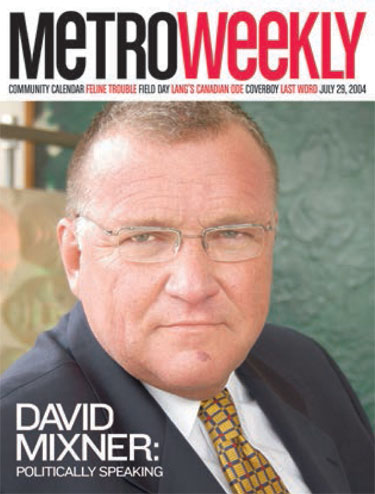
David Mixner
Interview by Randy Shulman. Photography by Todd Franson
MW: George W. Bush.
MIXNER: He’s a dangerous, dangerous man. The most dangerous president I have ever seen in all my years. He makes Nixon look like a liberal. If someone said to me, what do you think is the most dangerous thing about George W. Bush, well, I mean, it’s hard to pick. But I always come up with a few choice bits. The obvious one is the tribe that I’m part of and what he’s doing to us. Our civil liberties are at stake, our separation of church and state is at stake, our Supreme Court is at stake. The ability of the president to go to war at choice is at stake. And pretty much the foreign policy of our country and disregard for the Geneva Accord is at stake. Our obligations to international treaties are at stake. I can’t remember when all of this has been at stake in an election. Planned Parenthood. Family clinics in Africa who can’t get money to distribute condoms for AIDS. It’s genocidal. This man has no regard for centuries of knowledge and tradition and the journeys of people who have stood for human rights and dignity. He has just completely thrown all of that aside. He is one of the most rigid ideologues I’ve ever seen occupy the presidency.
MW: How do you feel about outing as a political tactic?
MIXNER: Let me just say, having worked in a number of state legislatures and campaigns, there’s nothing more infuriating than coming up to a closeted person who’s working against you. When you’re working eighteen hours a day, seven days a week and suddenly you find out that the guy who’s sending out the negative press release is a member of your tribe. It’s like blacks for George Wallace — I’m like “Huh?”
Now, having said that, and understanding how infuriating it has been in my life to come across those people, it’s so very important that, given our journey — especially with AIDS — that we don’t become them. If our ideas rest and fall on extortion and blackmail, then what are our ideas worth? I hope we would create an attractiveness that would be irresistible to any closeted gay person, that they’d want to join us eventually. I’m terrified that I’m gonna wake up some morning and some kid on the Hill is going to have killed himself. And then how are we going to feel about outing? We’re playing with people’s lives. We’re making their decisions for their life journeys. It’s not a small deal. I almost killed myself when I was blackmailed. I know the terror I felt, I know the fear. I really hope that in this time where we have great ideas of human rights and liberty and justice and equality to take to the American people, and also to maybe redefine for them what love is, that our ideas and our chances on victory do not rest on such anger.
The world is filled with hypocrites. That is just a fact of life. Now the question is, do we give them a forum? Is that our battle? To out people? Or is our battle equality, justice and liberty? Where do we put our energy? Do we jerk off and feel good that got rid of our anger by outing these people? Or do we focus on the battle?
MW: You’ve known Bill Clinton for thirty-five years. What are your thoughts about his presidency and the gay community?
MIXNER: Bill Clinton will go down in history as one of the greatest presidents for this community, ever. Ever, ever, ever, ever. For the scope and the breadth of the changes he made in the agencies and the State Department. It was against the law for us to openly serve in the State Department before he came in. People seem to forget that. Against the law. We could not work in the State Department. He made historical changes across the board. But he was far from perfect — DOMA, Don’t Ask, Don’t Tell.
MW: Have you read the book?
MIXNER: No. Nine hundred pages of his life, are you kidding? I don’t think so. I won’t read nine-hundred pages of my life.
MW: DOMA is not addressed in it.
MIXNER: If I was him, I wouldn’t want to mention it either.
12. Brett Parson, “Police Story”
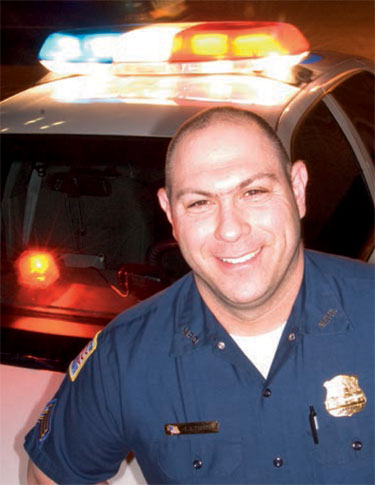
Brett Parson
Interview by Sean Bugg. Photography by Todd Franson
MW: What’s different between being a police officer and being a police officer in the GLLU?
PARSON: The first thing I want to do is turn that question around and tell you what’s not different. We’re police officers just like any other police officers in D.C., with full jurisdiction and full investigative authority and arrest powers. We specialize in dealing with the GLBT community. Other police officers may be assigned to the sex offense branch, the check and fraud unit, or school resource officers — they each have a specialty and when issues come up in that particular subject area, they are called upon to assist. That’s what we do in GLLU. We specialize in dealing with a community that has been traditionally under-served, disrespected and discriminated against. There are many ways that we serve that community, and probably the most important is that we do not just focus exclusively on community relations. We do general policing.
MW: When was the first time you came out after you joined the police?
PARSON: I have no idea because it was not a conscious effort on my part. When I chose to leave professional ice hockey to go into law enforcement, my partner and I decided it was going to be a non-issue. I was not going to change pronouns. I wasn’t going to be ambiguous about what our relationship was. And it was never an issue, from day one at the academy. So I really can’t pinpoint a day — it just didn’t happen.
Let’s face it, I’m not exactly a wallflower and if there was anybody who had a problem with it, chances are they probably weren’t going to stand up to me and say, “Oh, you’re going to fuckin’ hell.” It just wasn’t going to happen. Could somebody else who had a different personality have gotten away with it the way I did? Maybe yes, maybe no. I don’t know.
MW: How was your coming out [to your family]?
PARSON: I probably had one of the better experiences. I didn’t choose to come out to my parents until I had a life partner. And my [then-partner] and I had been together for about 6 months or so when both of us decided we wanted our families to know what was going on, so we both went to tell our parents on Thanksgiving. I had no anxiety about it. I knew my parents would not have a problem with it. It was just going to be a matter of delivering it.
My mom and dad were waiting for me because we were getting ready to go out for the traditional Thanksgiving Jewish meal of Chinese food, and I said, “Sit down, I want to tell you something.” I never do that. “What, what, what? We’re hungry,” my dad said. I said, “I’ve got something I want to talk about.” “Can we talk about it in the restaurant?” “No, I don’t want to talk about it in the restaurant.”
So we talked about my work in professional hockey at the time and how I was away from home and there are parts of me you never see. My father finally said, “What are you trying to say?” I said, “Well, there’s somebody in my life. And his name is Mike.” And my father said, “And we needed to stay away from the Chinese restaurant for that? Come on, let’s go.” No issue whatsoever. Didn’t miss a beat. We talked about it throughout dinner, and they called the neighbors over from another table: “Hey, our son’s gay, isn’t this great? Want an egg roll?”
13. Ruby Corado, “Trans-American”
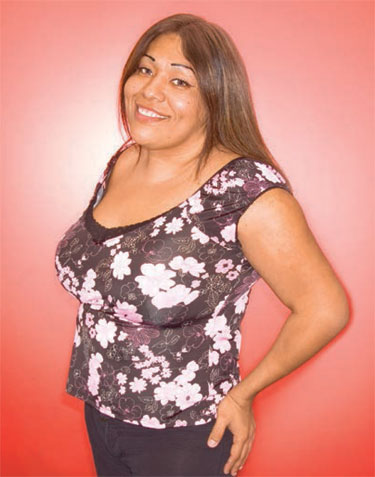
Ruby Corado
Interview by Sean Bugg. Photography by Todd Franson
MW: What led you to get involved with the coalition to change D.C.’s Human Rights Act?
CORADO: In the ’90s, my friends and I would go to a party or a club on Saturday and we’d have so much fun. It would be 4 a.m. and we wanted to still be in drag and living in the moment we were having. And then people on the street would start calling us names. That’s really how it all started. I realized that there were many of us who were very feminine — what we call “gender queer” now — and we had some special needs.
Also, for myself, I realized that with all of the changes I was going through, I was feeling fabulous. I was really living the life I wanted to live and feeling great and so proud of myself and on top of the world. And then I get on the bus and get called “faggot.” And that’s when I realized that the person I was becoming really had fewer opportunities, had many more barriers than when I looked not so feminine. I actually lost my job.
I was finding that things were a lot tougher. This beautiful, wonderful, amazing person that I was becoming was not supposed to be out in public. And because I was bringing it out in public, people were very cruel. I would apply for jobs and they’d look at me funny from the moment I walked in the door. Really, when I was living as a gay person I had some benefits, because even when I was super gay, the moment I looked butch, that’s where it all stopped. But once I was becoming this gorgeous person, there was no turning back. I cannot be butch anymore. I am who I am. And that’s how I got involved as an activist.
MW: When you look at the Human Rights Act as now amended, what’s the best thing you expect to happen?
CORADO: For many years in this city, transgender people have had really bad experiences, beginning with the violence that we’ve suffered. D.C. is one of the five worst cities for transgender people in the whole country. And being out there every day trying to survive and then trying to integrate into a society that doesn’t have clear protections for transgender and gender queer people, having this [law] is like a big gift because sometimes in order to fight a war you need to have ammunition.
It feels like we have a tool to educate people, a tool to educate ourselves about what our rights are. It’s very frustrating for a community activist that every day we encounter the needs of transgender and gender queer people, and sometimes there are very few things that we’re able to do. If we have a kid who is transgender or gender queer who doesn’t have a job, a place to live or medical care — sometimes we just don’t have many things that we can give them. So this legislation making it clear that it is not okay to discriminate, we have something we can begin to use as a tool in educating people.
MW: You mentioned the difficulties the transgender community has faced in D.C. over the past few years, particularly violence. Why do transgender people face such problems?
CORADO: Unfortunately, in big cities like D.C., we have transgender people who are so out and so proud, that some people feel that it’s not okay, that we are not supposed to be happy. And, unfortunately, it translates into violence. In the last decade there have been a lot of transgender people killed, not to even mention the transgender people who have been beaten up. There’s not a month that goes by that you don’t hear about somebody getting beaten up in Columbia Heights, Adams Morgan, Capitol Hill, you name it. They aren’t getting beat up for being straight-acting. They’re getting beat up for being too feminine, for being too butch.
14. Cybill Shepherd, “Cybill Rights”
Interview by Randy Shulman
MW: You have been quoted as saying that you had wondered about lesbianism at various times during your life. “I wanted to be open to the possibility of having a woman as a lover. I am not actively pursuing it but it is not over yet,” is how the quote reads.
SHEPHERD: It’s not over till it’s over.
MW: Well, if the opportunity arose, do you honestly think you would be open to it?
SHEPHERD: Yes, I do. I don’t know how you describe me then. I think there are some things I could say that are not politically correct, but I have to say that it definitely would be a possibility, depending on the person.
MW: There are a lot of people who would just shut that side of themselves off, who would just try to avoid it. For you to be even frank about the possibility of it is extraordinary.
SHEPHERD: Well, you know, Imarched on Washington in a major gay and lesbian march. The Human Rights Campaign sponsored me, and when I got there I said, “I want to be in that first row and carry the banner” and they said, “I’m sorry, unless you’re gay or lesbian, we’re not going to let you carry it. Because the people who’ve worked so hard, they deserve to carry it.” I took issue with that. I said, “I don’t know why you’d have to be gay and lesbian to lead the march and carry the banner. It is an equal investment for anyone, regardless of what their orientation is or whatever you want to call it.” I said, “Would Martin Luther King not have let me march with him because my skin was white? I don’t see any difference in the issue.” It’s about bigotry and hatred.
MW: Did you end up carrying the banner?
SHEPHERD: I did.
MW: Why has gay rights, in particular, been such an important topic to you?
SHEPHERD: I think of myself as being born as a political being, and there was a moment in my life [where it came together for me]. It was in 1968, when Martin Luther King was killed — assassinated — about three and a half miles from where I was in high school. I’ll never forget it. They announced it over the intercom that school was closing early and we were all to go home. I remember going out and looking towards downtown [Memphis], stricken, feeling responsible, feeling the heaviness of that hatred, of racial hatred, and feeling terrible that I hadn’t done anything to support the right way, meaning the fair way. And since I’d been born and raised in the segregated South, I remember “colored-only” and “white-only” bathrooms. And during the Mid-South Fair, the blacks went on a different day from the whites. The only black people I knew growing up were domesticated servants. Being around that hatred, I had internalized on some deep, emotional level an empathy — knowing it was wrong, but never talking, hearing racist comments all the time in my home and everywhere, but not standing up. Then when I got into the ninth grade, I began to be more enlightened. I had close friends and we all agreed on it. It was wrong, it was a horrible racial inequality in this country and it needed to be addressed.
So, to answer your question, as you open yourself up to civil rights, it really doesn’t matter what your excuse is for handing human beings something that says “You’re less than me, you don’t get the equal rights should you choose to have a partnership with someone. You don’t get the economic benefits or the tax benefits of marriage.” Once you start going towards what I call the “right thinking,” you can’t draw the line. You have to go all the way. You can’t discriminate.
MW: It would help if more high-profile celebrities such as yourself put themselves front and center for the cause. There are so many out there who are gay but still in the closet. Why do you think it’s so difficult for actors or actresses to feel comfortable enough to be out?
SHEPHERD: Well, even I lost a very lucrative contract to speak to a women’s organization in Texas the day after it was announced that I was doing The L Word. So people are discriminated against and are losing jobs. So, of course, there’s fear. I had a lot of fear. I don’t know what I was afraid of. I had a lot of fear when the episodes first came on, a huge amount of fear that I’d never really felt before. I think that everybody has his own prejudice inside, and often we have to start to enlighten ourselves about our own prejudices. And we’re fed these lies and the hatred in so many ways that you have to confront your own prejudices. I don’t think that any person alive is free from prejudice. We’ll never be free from prejudice. It’s part of being human. What was my fear? Was my fear that people would think I was a lesbian? And then would they think less of me? Was my fear that I am a lesbian? Was my fear that I would get cooties? I don’t know. I just had a lot of fear. And also playing into that was the fact was that being sexual in a part for a woman my age in this business is very rare. We’re usually stuck with playing the crazy mothers. And we’re lucky to get those parts.
15. Ron Simmons, “Radically Relevant”
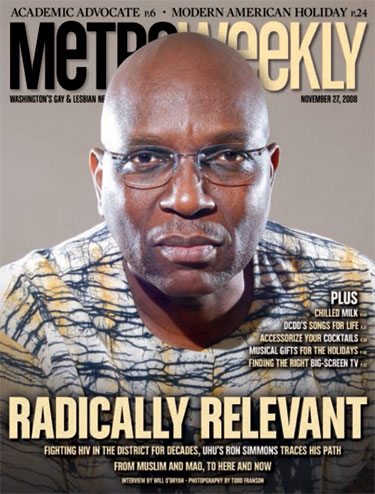
Ron Simmons
Interview by Will O’Bryan. Photography by Todd Franson
MW: What was your childhood like in Brooklyn?
SIMMONS: It was hell. I had a horrible childhood. I was suicidal at 13. If I seem to laugh a lot now, it’s because I think about then.
I was introduced to homosexuality at an early age — I was 5 or 6. My cousin, maybe a year or two older, his family had gotten evicted so he was staying with us. He and I were sleeping in the same bed. One night, he says to me, “Do you want to do what the grownups do?” I had no idea what the he was talking about.
MW: Did he mean pay taxes?
SIMMONS: Right! [Laughs.] He showed me. He took me in his arms and he kissed me. It was just wonderful.
I believe, frankly, that being gay — as opposed to being homosexual, really feeling “I am gay” — is much more of an innate, kind of spiritual thing. In my case, it was going to be there already, but that triggered it at such an early age. I never thought I was doing anything wrong. It felt good. What was I doing? Holding a guy, embracing, and basically playing house.
In the second grade, I played serious house with a guy named Larry. We put my sister’s doll under my shirt and pretended I was pregnant. We had no idea what we were doing. We were just acting out, a fantasy. I felt perfectly comfortable. He was really cute.
What happened was puberty. In fifth grade, he started chasing the girls. And so did the other guys. I realized that I didn’t want to. I couldn’t figure out why we couldn’t go back and have fun with each other the way we did before.
Then the name calling started: “faggot.”
Because I was studious, I guess an attractive kid, the girls would chase me — and that would terrify me. I didn’t know quite how to react to what was happening around me. Pulling away from the girls, you become stigmatized. I was the sissy.
I studied a lot, and that paid off in that I did quite well in school. When I reached junior high school, they changed the ruling and said that basically a kid could go to any junior high school. My mother immediately signed me up to go way out — Sheepshead Bay. There was a good chance that the white kids would not really be happy to see me coming. They were waiting for you. If you got off at the stop in the Italian neighborhood, there was a lot of flak. If you got off at the stop in the Jewish neighborhood — the school was right in the middle — you had a better chance. In high school, I do remember one time some white guys calling out “nigger.”
MW: So, out of the homophobic frying pan and into the racist fire?
SIMMONS: Right. Needless to say, the sexual thing went into this deep, deep closet that didn’t come out again until I went away to college. I went away to college by God’s grace, because Lord knows I wasn’t supposed to. So many times in my life, things have just happened that it’s like something divine going on.
16. John Waters, “Waters World”
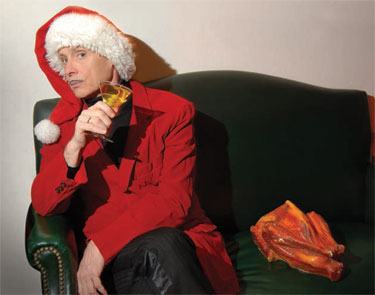
John Waters
Interview by Randy Shulman. Photography by Todd Franson
MW: What do you look for in a man?
WATERS: You mean a boyfriend man?
MW: Yes.
WATERS: My favorite is a blue-collar closet queen because they don’t want to be in my movies. They don’t want to meet famous people. They don’t want to go on tour with me. They want to come over to my house and hang out. I’ve never had a famous boyfriend. Anybody that would want to walk the red carpet with me would be a bad boyfriend. I don’t go to work with them. Why should they want to go to work with me? People have to be able to make me laugh. I like people that have had some backstory. I don’t want somebody like me especially, they don’t have to be intellectual at all. I know enough smart people. Who wants to talk about books in bed?
MW: Do you have a boyfriend at the moment?
WATERS: No, but I have a couple friends I see — that I always see.
MW: Have you ever had a long-term boyfriend?
WATERS: Yeah, three.
MW: What’s the longest?
WATERS: Five years. But I never lived with ’em. I could never live with anybody that would allow me to dominate them enough so that they could live in this house, the way it looks, totally my taste. I wouldn’t want to be my boyfriend.
MW: Clearly they wanted to be your boyfriend.
WATERS: That isn’t a boyfriend, that’s a groupie.
MW: So no marriage for John Waters?
WATERS: Oh, God, no. I have a great life as a single man. You kidding? At Elton John’s party, I got seated next to Yoko Ono. Joan Kennedy, at another party. I have a great life as a single man. I live in four cities. I am very happy to be a single man. I don’t need somebody else to make me feel better.
MW: In Metro Weekly we do a feature where we ask a series of questions to our Nightlife Coverboys. I want to ask you three questions from that list, the obvious one being what’s on you nightstand?
WATERS: I have two nightstands because I have a bed with a table on each side of it. So I’ll tell you each side. On the left side is three books, The Story of Chicken Little, Slovenly Peter and Baltimore Afire. I also collect fake food — so there’s a bowl of fake grits. There is a can opener Patty Hearst gave me that is a horse’s ass. There is a picture of the Queen from Snow White.
On the right side table there’s more fake food — a bowl of cereal that really looks real, a little piece of bacon, a pickle, five books — Impossible Princess by Kevin Killian, Monkey Painting by Thierry Lenain, All Around Atlantis by Deborah Eisenberg, and Hotel Theory by Wayne Kostenbaum — a box of Kleenex, brass knuckles, an eight-ball that tells your fortune — it’s broken — and a rubber knife.
MW: Do you keep anything in the drawers of the nightstands?
WATERS: Yeah. But I’m not telling you what’s in there. I’ve told you enough, haven’t I?
MW: Where is the most unusual place that John Waters has ever had sex?
WATERS: That I wouldn’t tell you. Because here’s the thing — people that tell a journalist that have no friends.
17. Chely Wright
Interview by Sean Bugg
MW: A lot of us agonize over how we come out to our families. How did you actually do it?
WRIGHT: I finally realized I had to tell my father because he called me at one point in Nashville and said, “Chel, we’re not close like we used to be. Have I done something wrong?” That just ripped my heart out. When you hide you start to live separate lives. You don’t share your life the way that you want to, because you have a secret.
When he got to my hotel room — he always likes to come hang out with me as I’m getting ready for a show — I said, “Pippy, I need to talk to you.” He said, “What’s wrong? You’re sick? You have cancer?” I said, “I don’t have cancer, but I need to tell you something I’ve needed to tell you my whole life but I’m scared and I’ve always been afraid you won’t want to be my dad anymore.” And I said, “I’m gay.”
So we had a two- or three-hour conversation about it. It ran the gamut of emotion. He kept saying, “Why didn’t you tell me? I’m disappointed that you didn’t know I’d love you no matter what.” And I said, “Dad, don’t you remember the gay jokes? You know, the jokes at the dinner table?” He buried his face in his hands and he just sobbed and said, “I’m sorry, I didn’t know.”
That’s a hard conversation to have with a man who was raised to believe that gays are sinful and wrong and condemned to hell. In that very instant, when the kid that he knew and loved and respected and admired and adored, told him that’s who I was, everything about that word changed for him.
MW: Has that impacted your father’s life back home?
WRIGHT: Of course. You know, I’ve got a community of gay support. It’s one thing for my family to support me, but when they go back into their world of small town and mid-America it’s tough. …
Here’s one of the most disturbing things that happened. My sister and I are very, very close, and she lives in a town of 400. She said that her preacher came to her house last Friday and said, “Jenny, I need to tell you that on Sunday I’m going to be preaching a sermon on homosexuality.” She said, “Really? Okay, well, don’t look at me when you do it.” When that preacher got up in front of the congregation — which, by the way, my nieces and nephews were sitting in the pews — he got a dry-erase board up and drew some graphs and stick figures and lines and arrows, and equated gays with murderers.
MW: Wow.
WRIGHT: That’s what we’re dealing with. Jen said it was all she could do to not break down and cry. Her 12-year-old son Max just kept looking up at her and saying, “Momma?” I can take people disparaging me and nasty phone calls coming into radio stations when I’m on the air, but to know that a preacher is up there telling my nieces and nephews that their Aunt Chely is the same as a murderer really, really upsets me. That’s a problem for me.
18. Edward Albee, “Who’s Afraid of Edward Albee?”
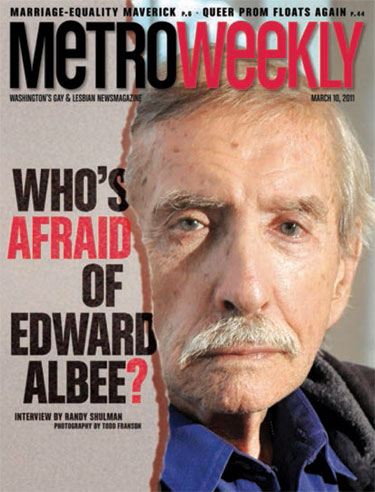
Edward Albee
Interview by Randy Shulman. Photography by Todd Franson
MW: You’ve seen quite a bit of history — in particular, a lot of gay history. You’ve seen enormous changes in your lifetime. Can you reflect a bit on how you feel about some of those changes with regard to the LGBT movement?
ALBEE: Well, you know, it’s very, very nice that gay people are not being lynched the way blacks were back in the really terrible days. But gays are still subject to the same prejudices and the same ill-treatment and the same second-class citizenship that a lot of other minorities — blacks, Jews, Muslims — are subject to.
One thing does trouble me. I don’t think that gay people are any different from anybody else, because I don’t think where you put your dick defines anything about your nature. Where you put your dick merely defines where you put your dick, right? I don’t understand at the same time why so many gays want to be exactly like so many of these awful breeders — these awful hetero types who really behave appallingly. Why do all gay people wish to vanish into this society? Is it self-protection? I don’t know. I just don’t want us to be forced to think that we must imitate other people and behave the way they do in order to become invisible.
I had a 35-year relationship. Were we married? Yeah, I guess we were. We certainly felt that we were. We certainly treated each other like we were married to each other. Did we ever feel the need to get a marriage license? No, of course not. We knew we were married to each other. All this legality that people seem so involved with nowadays, it troubles me just a little bit. I understand all the problems to come with wills and families denying access to the loved one and all of that, but come on, do we really want to be exactly like straight people?
MW: But those are very real situations, real problems for some people.
ALBEE: Yeah, and those problems should be solved, of course. There should be nothing legally standing in the way of two people to be married if they wish to be, of course.
MW: Going back to something you said a moment ago, I think being gay is more than just where you put your dick. I think being gay is actually an emotional attachment to the person of the same sex.
ALBEE: What is the difference between emotional attachment of a guy to a guy and emotional attachment of a guy to a gal? What’s the difference?
MW: Are you saying there’s no difference? I suppose, from a basic, human standpoint, there’s no difference. Our opponents would cite the differences from a reproductive standpoint — you know, “It’s not the way God intended it to be, it’s unnatural.”
ALBEE: I would like to meet God someday so that I can ask him whether he really feels that way about homosexuals. I can’t imagine a God who would be that prejudiced.
MW: Well, what if you did meet God? And what if God said to you, “Actually, homosexuality is unnatural. It was a mistake and I didn’t mean for it to happen.” What would you then say to God?
ALBEE: I would say, “Grow up.”
19. Wade Davis, “Field Goals”
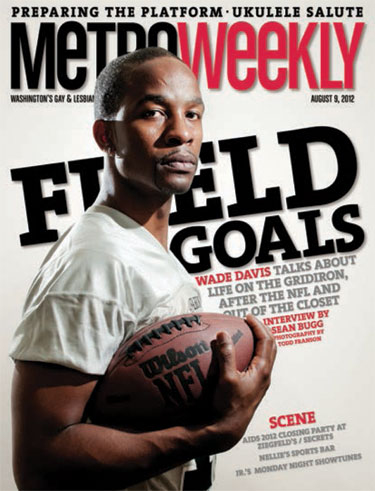
Wade Davis
Interview by Sean Bugg. Photography by Todd Franson
MW: When did you first have an inkling that you were gay?
DAVIS: I was in a gym-class locker room — not football, but a high school gym-class locker room. I was pretty late in understanding that. I just remember going home, watching straight porn for hours trying to focus on the woman and make myself believe that what happened was just what guys do as a comparison thing: “Oh, I’m just comparing my body to this guy.” I think that that does happen amongst adolescent boys, but I knew at that moment it was different. Like, when I saw this guy, I wanted to hold his hand, kiss him, touch him. It wasn’t just that I wanted to have a flex off. So that was the first moment that I knew there was something different.
MW: So you go to college, you’re playing ball. How did you construct a closet?
DAVIS: I started to emulate everything that I saw straight guys do that I thought I should do. Having a girlfriend, wearing oversized pants and oversized T-shirts. Making sure that if I went to a club I took a girl home with me — whether we did anything or not, which most times we didn’t. I looked the part of a straight guy, a football player who didn’t do anything that was gay. And I was always a shit-talker. I was born to talk shit, so that came easy for me.
MW: Whenever we talk about why gay men have not come out in professional sports, we end up talking about locker rooms. What is it about the locker room that keeps people in the closet?
DAVIS: I think it’s a couple of things that intersect. For me, in the football locker room I never was worried about being attracted to any of my teammates, because that was a place that was sacred to me. That was a place where I was with my family, like with my brothers. But one of the biggest issues is that straight guys are just worried that another man is going to objectify them. Straight guys are used to never being objectified unless they ask for it, unless they take off their shirt around women. But the idea of having another man, who may be more physically imposing than you, be attracted to you, is a space where men can be objectified in a way that makes them feel weak, so it challenges their ideas of masculinity. I think that’s part of it.
For gay men, it’s the worry that their teammates will assume that because I’m gay I’m automatically attracted to you, which is so far from the truth. I’ve spoken to many of my other gay friends, and when you’re in the locker room the last thing you’re thinking about is your teammates in a sexual way. I mean, it never crossed my mind. No. Because that’s the space where you’re actually happy, you’re feeling safe and you don’t want to make anyone else feel unsafe.
MW: During your course of time in the NFL, did you ever come out to anybody?
DAVIS: No-ho-ho-ho. [Laughs.] No, there was never a question in my mind. Never a thought. There was not one football player that I would have considered telling.
MW: You said that you’re a natural-born shit-talker. Did you ever find yourself talking shit about gays and lesbians to cover yourself?
DAVIS: One of the things I’m least proud of is that I was a bully in high school. I wanted to make my friends think that I couldn’t be gay if I made fun of other gay people. We used to do this thing at lunchtime, we called it “holding court.” We would sit on top of the tables right at the door and as soon as someone walked in we would start making fun of them for whatever reason. And that was part of my posturing, that was part of me proving my masculinity, proving I was the big dog.
MW: You’ve spent a good part of your career in a sport where African-American men are expected and respected. In general, an African-American male face is kind of the face of a lot of pro sports. Now you’re a black man in the gay community, and that community is perceived as a very white face. How is it a different experience for you, as a black man?
DAVIS: It’s saddening that the norm is for you to be black and an athlete. It’s not the norm for you to be black and anything else; maybe you’re black and a rapper, black and a musician.
I’m lucky that, because of being an ex-athlete, I’m privileged to be able to exist in the gay white world. I’m accepted. People want to be my friend, people want to date me. I’ve been told more times than I can count that, “Normally I don’t date black men but I would date you.” And people actually think that that’s an okay comment, that I’m going to just say, “Oh, thanks!”
But I have a lot of black gay friends who don’t feel like they fit into the gay community. And I understand my privilege there, so I try as much as I can to have thoughtful conversations about it. Oftentimes, if you are white and gay, you don’t understand that you have a built-in community, that the black gay community is very disjointed because of the amount of shame and stigma that black men face. I definitely feel an obligation to stay connected to the gay black community, but I also want to build a bridge between both communities, so that black gay men feel that they can interact with the white gay community and vice versa. You know, like the old saying goes, all your black friends have lots of white friends, and all your white friends have one black friend. And it’s kind of true. It’s so sad.
MW: Much of the LGBT community likes to think of itself as more progressive on race issues than the rest of the country. Do you think the LGBT community actually is a little bit better on race, or is that something we just tell ourselves to feel better?
DAVIS: People won’t like this, but I think it’s something we tell ourselves to make ourselves look better. Gay people have been oppressed for a while — we’re hated and we’re fighting against it. But as soon as we have a little bit of power we oppress someone else in our own community because we’re just not conscious of the fact that we’re doing it. It’s like someone saying, “I’m not racist, I’m colorblind.” When you don’t see color, you can’t see racism.
20. George Takei, “The Takei Time”
Interview by Randy Shulman
MW: You and Brad have been together for how long now?
TAKEI: Twenty-five years now. …
MW: Do you still wake up in the morning and look at Brad and feel the love that you felt 25 years ago?
TAKEI: Yes. I love to hear his breathing and sometimes his snoring right next to me. Brad travels with me wherever I go, even when it’s some business thing. He’ll roam around the city while I’m in meetings. Our lives are intertwined.
MW: It’s nice to find that kind of lasting love.
TAKEI: It is. And you know, in many ways, because we’re gay and there’s this public sense that gays aren’t stable, we feel that we’re blessed in that we can be as happy as we are together. I don’t mean it in the all lovey-dovey things, but it’s a normal kind of thing between two people. You have your differences and you have your arguments, but that’s all part of it. And at night, when you’re going to bed, you see that all that arguing is really petty and silly. We really love each other and that’s what really counts.
MW: How old is Brad, may I ask?
TAKEI: Brad is 57. I’m 75.
MW: So nearly a 20-year difference between you. Has that ever been an issue?
TAKEI: Well, it is a concern on the part of both of us because we have DOMA to contend with. We had very good friends, a couple — a gay couple — in Washington, D.C. They’d been together for almost 20 years. Mark went out of town on business and when he came back and opened the apartment door, he found his partner on the floor. He had had a heart attack and had passed. His partner’s brother lived in Boston — they were estranged for a long, long time. He happened to be a lawyer and he came down and took everything. And that is a big concern with us. The laws are against us.
That’s what the Boston case that’s before the Supreme Court is all about. It was a lesbian couple, and one passed and because their union — they were married in Massachusetts — but because their union is not federally recognized because we have DOMA, the surviving spouse would have had to pay over half of the deceased’s estate tax, which would not have happened if they were straight. I mean, it’s a cruel situation. And me being older than Brad, I’m very concerned about that. We built our lives together. Our estate is ours, and I want it to go to Brad without that kind of taxation, like any married couple who have been together for 25 years.
There are hundreds of laws that make life difficult and sometimes cruel for LGBT couples because of DOMA. And we are optimistic that we can live to the point where we will see DOMA gone forever — and I think that’s going to be very soon. In fact, next year is going to be a good year, I think, for the LGBT community because that issue is before the Supreme Court. We also have Proposition 8 before the Supreme Court. Two courts have already ruled it unconstitutional and I am almost confident that it’s going to be ruled unconstitutional by the Supreme Court. But the Boston case is the important one because it challenges DOMA.
So I think it’s an amazing thing that’s happening in our lifetime. And 2013 is going to be eminently fulfilling for our community. I think the Supreme Court is going to come through for us. I’m an optimist.
Visit us online at MetroWeekly.com. Sign up for our email list, The Daily Blast, at metroweekly.com/join.
Support Metro Weekly’s Journalism
These are challenging times for news organizations. And yet it’s crucial we stay active and provide vital resources and information to both our local readers and the world. So won’t you please take a moment and consider supporting Metro Weekly with a membership? For as little as $5 a month, you can help ensure Metro Weekly magazine and MetroWeekly.com remain free, viable resources as we provide the best, most diverse, culturally-resonant LGBTQ coverage in both the D.C. region and around the world. Memberships come with exclusive perks and discounts, your own personal digital delivery of each week’s magazine (and an archive), access to our Member's Lounge when it launches this fall, and exclusive members-only items like Metro Weekly Membership Mugs and Tote Bags! Check out all our membership levels here and please join us today!



